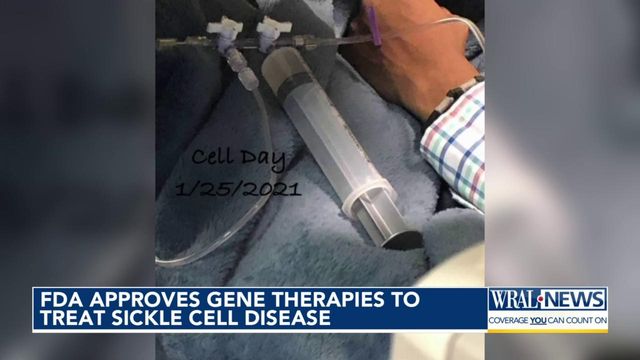How newly approved gene therapies helped a North Carolina man suffering from sickle cell disease
Michael Edmonds got very familiar with hospitals growing up with sickle cell disease. He was born with it, dealing with what he describes as sharp pain.
“If you can imagine needles being just stuck into you constantly, that’s pretty much what it feels like,” he said. “I was just in and out of the hospital every other month.”
Edmonds was in his senior year of high school when he was offered the chance to participate in a study trial for a new gene therapy.
“I can definitely tell you that I was skeptical,” he recalled.
Edmonds participated in an intensive gene therapy study trial through Duke.
“In general, it’s patients who are having more pain than most others. [It’s] patients who have what we what we call a more severe course of sickle cell disease,” said Dr. Nirmish Shah, when asked how Edmonds was chosen for the study.
Shah is the director of the sickle cell transition program at Duke University. Shah said he has known Edmonds since he was young and knew Edmonds would be a good candidate for the study given his experience with the disease.
Just this month, the FDA approved Casgevy and Lyfgenia for treatment in people 12 and older. Shah explained how they work.
“The two different treatments have two different techniques, slightly. One is going to actually edit the gene; the other is going to insert a gene. And in both situations, it’s going to increase either baby blood or non-sickle cell blood,” Shah said. “By doing so, you’re doing two very good things, you’re going to decrease the amount of sickle cells that are floating around, and you’re going to have more of this protective blood now being made by the bone marrow.”
Chemotherapy is also part of the process.
“Patients with sickle cell, in particular, who get chemotherapy, can have long-term outcomes, but also immediate consequences. That immediate consequence is the potential for infertility,” Shah said.
That piece of the study was a heavy thing to consider, according to Denise Edmonds, Michael’s mom.
“As a family, we sat down and talked about putting your child through chemo that you don’t necessarily have to have to survive,” she said.
Michael said he was willing to take the leap of faith if meant relief for him.
“My thought was, ‘Okay, it can’t be any worse than what I’m going through now,’” he said.
Denise said Michael started testing for the study in September 2020, had chemotherapy in January 2021, and spent January 18, 2021, to March 5, 2021, in the hospital for the treatment. Before this approval announcement, Dr. Shah said options were scarce for people suffering from the disease.
“We have four approved therapies for sickle cell disease. As of, probably about four years ago, we only had two,” he said. “I feel like we’re starting to kind of hit the curve where we’re starting to have an accelerated amount of options. But those four therapies are just the beginning.”
Shah calls the new gene therapies transformative.
“This is transformative, where we’re getting very close to a cure,” he said. “It’s not a complete cure, but it’s very close to and in the ideal setting.”
The next step, he says, is accessibility to care.
“There’s only going to be a few centers in the beginning, and there’s going to be a lot of interest,” Shah said. “There are many sickle cell patients who don’t have access to a major center, let alone a sickle cell specialist, let alone a center that now has gene therapy. We’re going to have to build a network to help all of our patients no matter where they are.”
While the experience was intensive, Edmonds said it was worth it.
“It feels like a brand-new life,” he said.













